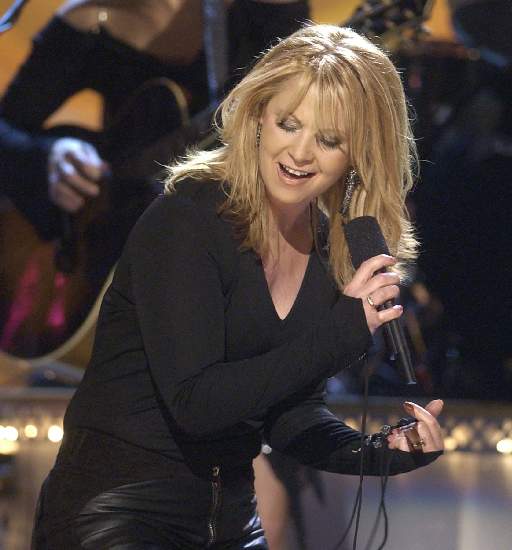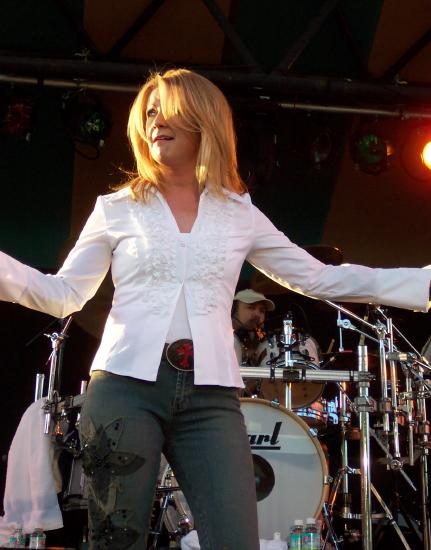The Heart Of a Classic
Patty Loveless Takes the Measure of Her, and Country Music's, Past on Sleepless Nights
By David McGee
A traditional country soul brilliantly displayed on Sleepless Nights
Since her first appearance in the Top 10 in 1988 ("If My Heart Had Windows"), Patty Loveless has carved out a most remarkable career marked by platinum-level mainstream success and critically acclaimed, unimpeachable forays into the heart of the music she loves most, classic country and bluegrass. Following a three-year absence from the studio, she's back with another routinely amazing album, Sleepless Nights, the subtitle of which says it all: The Traditional Country Soul of Patty Loveless. Fourteen songs in all, it's an album with multiple meanings for Loveless and her usual co-conspirator, husband-producer Emory Gordy. For starters, it gives Loveless a chance to honor both the stylists and the songs that she drew inspiration from in her formative years-it features four terrific interpretations of George Jones, including a lively take on Possum's first big hit, 1955's "Why Baby Why" (the album opener); a heart-tugging rendition of the 1962 monument, "She Thinks I Still Care"; a rarity in the form of "That's All It Took," originally a 1966 duet between Jones and one of rock 'n' roll's top hitmakers of the time, Gene Pitney; and a stone, steel- and fiddle-drenched honky tonk weeper from 1958, "Color of the Blues"; two '50s chart-topping landmarks done in versions close in sound and style to the originals in a harmony-rich version of Ray Price's "Crazy Arms" (1956) and a beautiful steel-and-twang rendition of Webb Pierce's 1953 broken-hearted, alcohol-soaked lament, "There Stands the Glass"; a stunning, keening take on the Davis Sisters' timeless bit of heartbreaking advice to the lovelorn, "I Forgot More Than You'll Ever Know"; a deep country treatment of Hank Locklin's 1960 #1 country/#8 pop hit, "Please Help Me, I'm Falling," with Loveless's mountain alto in full, crying flight; a rare Porter & Dolly B side, the devastating chronicle of a self-destructive, one-sided love affair, "The Pain of Loving You," written by Porter and Dolly; and, among others, a somber, tear-stained reading of Hank Williams's first #1, from 1952, "Cold, Cold Heart."
That the songs sound so right is no accident, either. Gordy assembled a studio band comprised of some of the same musicians (Harold Bradley, Hargus "Pig" Robbins, Billy Linneman) who had shaped the "Nashville Sound" that so entranced a young Patty Loveless growing up in Pikeville, KY, and blended them with some of Loveless's past and present band members and contemporary Music City sidemen of note, among them Deanie Richardson, Guthrie Trapp, Biff Watson, Steve Gibson and Al Perkins. The singer's past and present are even represented in the choice of her background singers-one being former labelmate and abiding "big brother" Vince Gill, the other a startling newcomer, 15-year-old Sydni Perry, who could hardly have made a more impressive debut in providing a keening second voice to Loveless's own. For an artist who prides herself on being a role model for young people, Loveless, with her unwavering work ethic, gives Perry a good example to follow.
Not least of all, Sleepless Nights is the culmination of a decade-long quest by Loveless to honor the memory of her late sister and first inspiration, Dottie, with whom Patty started out as a trio including their brother Roger, who later dropped off his sister's solo demo tape with Nashville power broker Tony Brown at MCA Nashville, who hipped his friend Emory Gordy to it, and the rest is country music history.
According to Loveless, many of the songs on Sleepless Nights were among her sister's favorite. "A lot of them were, in fact," she says. "Dottie was more influenced by Patsy Cline; I was influenced by many others, including Patsy. But if Dottie sounded like anyone, it was a mixture of Patsy, Brenda Lee, Connie Smith and Wanda Jackson. Which was a great sound."
'We had always revisited these songs over the years, but we paid more attention to it this time. During that time, we were talking about doing such a record as this, and maybe even writing things that sound like vintage classics and give it that sound.'Loveless, saying the songs on Sleepless Night have a timeless and timely quality, reveals that the break she's taken the past three years has allowed her and Gordy to go deeper into what they love to do anyway, exploring both the great country canon from years past and reflecting on how the music has affected their lives. "My husband truly has a love for vintage music and classic music," she says, "and he and I having the opportunity to be at home for the past couple of years has enabled us to be able to listen to some of the old classics and share our feelings with each other about our pasts. And to be able to reminisce about our childhoods and growing up. We were able to go up and listen in our little studio in our home in Georgia; I finally made it my residence in 2006. We were able to go up to our little studio after dinner and we'd stay up until two or three o'clock in the morning—we're night owls—musicians are, usually—we would listen to these old songs. We had always revisited these songs over the years, but we paid more attention to it this time. During that time, we were talking about doing such a record as this, and maybe even writing things that sound like vintage classics and give it that sound. But when we were approached by Saguaro Road Records, we offered them this idea we had about going back and revisiting some of this music and cutting it in the same way it was cut back then, as far as the instrumentation and not getting too far away from the originals. They just loved the idea. So it was perfect for us. I'm just so glad we all connected."
The selection of the accompanying band was a joint Gordy-Loveless decision as well. "We wanted to mix some of the musicians who had played on some my records, like Steve Gibson, Biff Watson and John Hobbs, with some of my players out on the road—Deanie Richardson on fiddle, Pete Finney on steel and a young man named Guthrie Trapp who plays wonderful electric guitar, acoustic guitar and mandolin as well. He was in my band for a couple of years, and he's been out with Jerry Douglas recently. Just a wonderful player from Alabama. We mixed them with Al Perkins, Pig Robbins, Harry Stinson—he also sings background vocals—and Billy Linneman on upright bass."
Speaking of the old veterans, Loveless recounts how, when she was a 16-year-old aspirings songwriter in Nashville with publishing deal with the Wilburn Brothers' company, Doyle Wilburn gave her a birthday present of an eight-song demo session. "What a gift, you know?" she says, sounding as excited about it now as she must have back then. "Pig and Billy are playing on that session. I believe also Don Helms, who passed away recently, was on steel."
And that 15-year-old wunderkind wailing away in the background? Young Sydni Perry?
"She was born in Smyrna, Georgia," Loveless says, "and I believe her family moved to Kentucky when she was still a baby. They came to Nashville when I was doing a signing at a record store, back in 2003, when we had record stores. She was nine years old, standing in line with her parents. She brought up her fiddle for me to sign. She was telling me she was learning to play fiddle and I mentioned to her about the fiddle player Deanie Richardson, because that's about the age that Deanie started learning how to play. Lo and behold, Deanie Richardson opens a school here in Nashville and this little girl takes lessons from Deanie. She tells Deanie a story about meeting me and what I had told her. Deanie brought her to our house to visit and do background vocals on the record. She's singing on 'Please Help Me I'm Falling,' and on 'The Pain of Loving You.' The kid is phenomenal vocally, very quick. It was so great to have her at the house. She was there about three days, went fishing in our pond, I think she really enjoyed herself, hated to leave. She's a fiddle player, too, and she's learning to play guitar. She's just amazing."
Nothing moves Loveless more, though, than discussing her early mentor, the late Porter Wagoner. Simply put, she says she couldn't have done Sleepless Nights without recording "The Pain of Loving You," a song she sang to a visibly moved Wagoner last year during a Grand Ole Opry celebration of the ailing star's 50th year with the show. But the connection between song and artist goes deeper, and the memory of it moves her still.
"I have a picture of me, my brother Roger and Porter, taken in Louisville, and the caption says we were singing 'The Pain of Loving You,'" she explains. "It was out in the boathouse where he used to love to go fishing. Roger and I went out with him to Center Hill Lake here in Nashville; it's beautiful and it was one of his favorite places to go. Jerry Reed, whom we've lost now, and Faron Young, all those guys used to be out there fishing and writing. It was a place for everybody to go. Bobby Bare—everybody! Center Hill Lake, Jerry Reed is probably out there fishing right now! And I don't blame him-it feels like Heaven out there. So it was the appropriate song for me to record, truly."
THE BLUEGRASS SPECIAL
Founder/Publisher/Editor: David McGee
Contributing Editors: Billy Altman, Derk Richardson
Logo Design: John Mendelsohn (www.johnmendelsohn.com)
Website Design: Kieran McGee (www.kieranmcgee.com)
Staff Photographers: Audrey Harrod (Louisville, KY; www.flickr.com/audreyharrod), Alicia Zappier (New York)
E-mail: thebluegrassspecial@gmail.com
Mailing Address: David McGee, 201 W. 85 St.—5B, New York, NY 10024
Founder/Publisher/Editor: David McGee
Contributing Editors: Billy Altman, Derk Richardson
Logo Design: John Mendelsohn (www.johnmendelsohn.com)
Website Design: Kieran McGee (www.kieranmcgee.com)
Staff Photographers: Audrey Harrod (Louisville, KY; www.flickr.com/audreyharrod), Alicia Zappier (New York)
E-mail: thebluegrassspecial@gmail.com
Mailing Address: David McGee, 201 W. 85 St.—5B, New York, NY 10024


